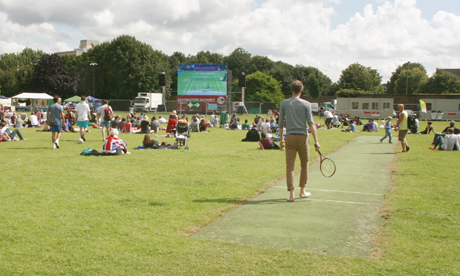Five things the Olympics got wrong

Olympic screen at Haggerston Park. Photograph: Hackney Citizen
I was one of those lucky buggers with a ticket to the Olympics. Had a wonderful time, thank you very much. I’ve discovered the joys of the brutal contest that is water polo, stood at the roadside when Wiggo won gold, seen a superb game of football played by women, and joined in the Mexican waves as Team GB men’s hockey went down all sticks blazing to the blasted Aussies. So having written a book called Why the Olympics Aren’t Good for Us and How They Can Be, have I been crying into my energy drink at all this unbounded success and joy? Not exactly.
Here’s my top five of what London 2012 managed to get very wrong:
1. A hockey tournament, played all on the one pitch, most games during the working day in a stadium that only holds 15,000. Same applies to basketball, handball, volleyball and beach volleyball. Why on Earth not spread the joy around the country World Cup style, and play the games in football stadiums temporarily converted to host other team sports that could have accommodated up to four times the crowds at a fraction of the ticket price?
2. The free-to-watch events were hugely popular. No stadium can hold a crowd of 300,000 plus, yet these were the kinds of numbers that turned out for the triathlon – a million watched the first Saturday’s road race. Yet most were raced round tight circuits over several laps. Compare this with an A to B style London marathon route, and quadruple the potential crowd with one simple change. Oh, and show off the East End, too, instead of the endless TV shots of landmarks the rest of the world are already only too familiar with.
3. The joyful crowds in the Olympic Park didn’t look anything like those joining in the celebrations in the surrounding boroughs of Newham, Tower Hamlets and Hackney. This was perhaps London 2012’s greatest failing, yet it was scarcely commented upon in all the well-deserved coverage given to a broadly diverse podium of Team GB medal-winners. In terms of those privileged enough to have tickets, these were the Home Counties Games. An audience served by those filling the jobs created – a black, urban working class, on short term contracts and not very well-paid either. A rather more uncomfortable picture of modern Britain.
4. The legacy ambassadors. Labour have appointed Tony Blair as theirs. Cameron has opted for Seb Coe. Perhaps either or both could explain all the claims made for London’s legacy in the context of the failure of every Games since Los Angeles 1984 to produce a sustainable boost in employment, raise levels of participation in sport, and increase tourism. They haven’t cared to ever since the bid was first put together, so it’s unlikely now, swept up in the euphoria, they’re going to inject any realism now.
5. Sponsors clambering all over the five rings, turning it into a logo to flog product, not a symbol for sport. All serving to obscure the biggest single sponsor of the Games and Team GB: you and me, the British taxpayer.
Yes, let’s join in the celebrations. Only the most one-dimensional version of progressive politics could fail to have been moved by these Games. But that’s no reason to discard our critical faculties at the turnstiles either. I went to the Olympics as a fan, I remain a critic, too. The two aren’t mutually exclusive. And after its all over I am more convinced than ever before that a critical sports politics should have a vital place in any popular project for human liberation. For a left that largely doesn’t take sport seriously, or if it does concentrates any concern almost exclusively on football, perhaps this might become our legacy of London 2012?
guardian.co.uk © Guardian News & Media Limited 2010
Published via the Guardian News Feed plugin for WordPress.
